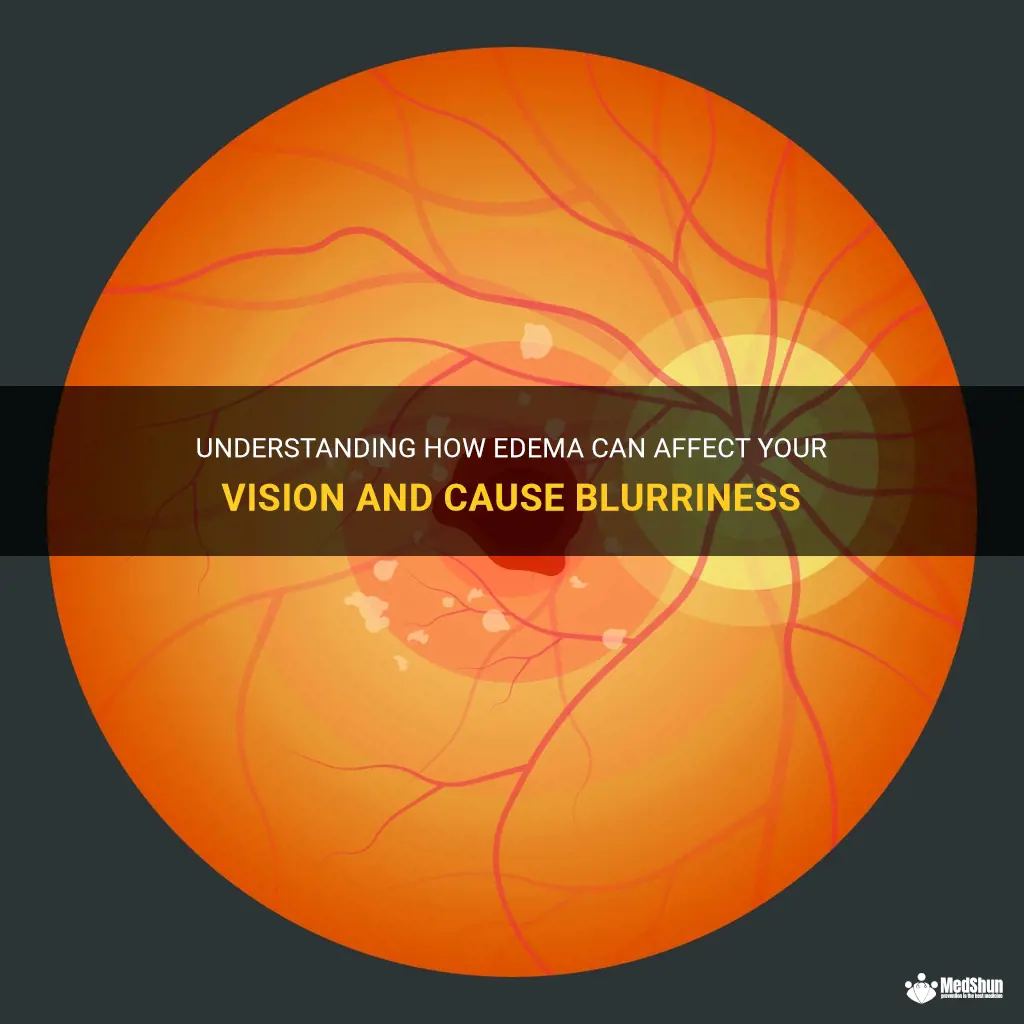
Edema, a condition characterized by the swelling of body tissues, is commonly associated with fluid retention and can affect various parts of the body. One intriguing aspect of edema is its potential to cause blurry vision. Blurry vision, a common symptom experienced by many, can be caused by a variety of factors such as eye strain or the need for prescription glasses. However, the connection between edema and blurry vision is worth exploring as it sheds light on a potentially overlooked aspect of this condition. Understanding how edema can impact vision offers valuable insights into the intricate relationship between our body's fluid balance and our visual perception.
| Characteristics | Values |
|---|---|
| Cause | Can Edema |
| Symptom | Blurry Vision |
What You'll Learn
- Can edema in specific parts of the body, such as the eyes or the brain, lead to blurry vision?
- How does edema affect the blood vessels in the eyes and can it result in blurred vision?
- Are there any underlying medical conditions that increase the risk of developing edema-related blurry vision?
- Can edema in the eye be resolved or treated to alleviate blurry vision symptoms?
- Are there any specific signs or symptoms that indicate edema is the cause of blurry vision, or could it be a symptom of a different condition?

Can edema in specific parts of the body, such as the eyes or the brain, lead to blurry vision?
Edema, or the swelling of tissues due to excess fluid accumulation, can occur in various parts of the body, including the eyes or the brain. When edema affects the eyes or the brain, it can indeed lead to blurry vision.
In the case of eye edema, also known as corneal edema, the cornea becomes swollen and can lose its transparency. The cornea is the clear, dome-shaped front surface of the eye that helps focus light entering the eye onto the retina, a light-sensitive tissue at the back of the eye. If the cornea swells, it can distort the passage of light, resulting in blurry vision.
Eye edema can be caused by various factors, such as eye surgery, trauma, or certain medical conditions like glaucoma or Fuchs' corneal dystrophy. Symptoms of corneal edema include blurry vision, sensitivity to light, discomfort, and halos around lights. Treatment options may include medications to reduce swelling, the use of protective lenses, or in severe cases, surgical intervention.
Edema in the brain, known as cerebral edema, can also lead to blurry vision. Cerebral edema involves the accumulation of fluid within the brain tissue, which can cause an increase in pressure within the skull. This increased pressure can compress the optic nerve, the nerve responsible for transmitting visual signals from the eyes to the brain. When the optic nerve is compressed, it can result in blurry or distorted vision.
Cerebral edema can be caused by various factors, such as traumatic brain injury, brain tumors, infections, or certain medical conditions like stroke or meningitis. In addition to blurry vision, symptoms of cerebral edema may include headaches, nausea, vomiting, confusion, and changes in consciousness. Treatment options for cerebral edema may include medications to reduce swelling, diuretics to remove excess fluid, or in severe cases, surgical intervention.
It is important to note that blurry vision can have multiple causes, and it is not always directly related to edema. Other factors, such as refractive errors (nearsightedness, farsightedness) or other eye conditions like cataracts or macular degeneration, can also cause blurry vision. Therefore, it is essential to consult with a healthcare professional for an accurate diagnosis and appropriate treatment.
In conclusion, edema in specific parts of the body, such as the eyes or the brain, can indeed lead to blurry vision. Eye edema can distort the passage of light through the cornea, while cerebral edema can compress the optic nerve. However, it is essential to consider other potential causes of blurry vision and seek medical advice for proper evaluation and treatment.
Understanding Achromatopsia: Causes, Symptoms, and Treatment Options
You may want to see also

How does edema affect the blood vessels in the eyes and can it result in blurred vision?
Edema, also known as swelling, can affect various parts of the body, including the blood vessels in the eyes. When edema occurs in the eyes, it can result in blurred vision. In this article, we will explore how edema affects the blood vessels in the eyes and discuss the potential consequences on vision.
Edema in the eyes can arise from various causes, such as allergies, infections, trauma, or underlying medical conditions like diabetes or hypertension. When edema occurs, fluid accumulates in the tissues surrounding the blood vessels in the eyes, leading to their expansion and compression. This compression can disrupt the normal flow of blood and nutrients to the eyes, potentially affecting vision.
The blood vessels in the eyes play a crucial role in delivering oxygen and nutrients to the surrounding tissues, including the retina, which is responsible for visual perception. When these blood vessels become constricted or compressed due to edema, the flow of blood may be compromised, leading to reduced oxygen and nutrient supply to the eyes. This lack of adequate nourishment can result in blurred vision, as the eye cells may not function optimally.
Furthermore, edema can also cause changes in the ocular fluids, specifically the aqueous and vitreous humors. These fluids help maintain the shape of the eyeball and contribute to its overall function. When edema occurs, the composition and consistency of these fluids can be altered, further affecting vision. The fluctuation in the refractive index of these fluids can result in the refraction of light becoming irregular, leading to blurred or distorted vision.
It is important to note that the severity of blurred vision caused by edema can vary depending on the extent and duration of the swelling. In some cases, the blurred vision may be temporary and resolve once the underlying cause of the edema is treated. However, if edema persists or recurs frequently, it can lead to more chronic vision problems, such as macular degeneration or optic neuropathy.
To diagnose and manage edema-related vision problems, it is crucial to consult an eye care professional. They may perform a comprehensive eye examination, including measuring visual acuity, assessing the pressure within the eyes, and examining the blood vessels and tissues for signs of edema. Based on the findings, the eye care professional may recommend various treatment options, including medications to reduce swelling, lifestyle modifications, or surgical interventions.
In conclusion, edema can affect the blood vessels in the eyes and result in blurred vision. The compression and disruption of blood flow caused by edema can compromise the delivery of oxygen and nutrients to the eyes, leading to visual disturbances. Understanding the underlying cause of the edema and seeking appropriate medical attention is crucial for managing and treating the associated vision problems.
Is It Possible for a Colorblind Person to Perceive White as Yellow?
You may want to see also

Are there any underlying medical conditions that increase the risk of developing edema-related blurry vision?
Edema, or the accumulation of excess fluid in the body's tissues, can sometimes result in blurry vision. While in some cases edema-related blurry vision may be temporary and harmless, it can also be a sign of an underlying medical condition. In this article, we will explore some of the medical conditions that can increase the risk of developing edema-related blurry vision.
- Diabetes: Diabetes is a chronic condition characterized by high blood sugar levels. If left unmanaged, diabetes can lead to damage in the blood vessels of the retina, a condition called diabetic retinopathy. This can cause fluid leakage and swelling in the retina, resulting in blurry vision.
- Hypertension: High blood pressure, or hypertension, can damage the blood vessels in the eyes, leading to fluid leakage and subsequent edema. This can result in blurry vision and other visual disturbances.
- Kidney disease: The kidneys play a crucial role in regulating fluid balance in the body. When the kidneys are not functioning properly, excess fluid can accumulate in the body, including in the eyes. This fluid buildup can cause blurry vision.
- Liver disease: Liver disease, such as cirrhosis or hepatitis, can lead to fluid retention in the body. This fluid can accumulate in various tissues, including the eyes, causing edema and blurry vision.
- Heart failure: When the heart is unable to pump blood effectively, fluid can accumulate in the body's tissues. This can include the eyes, leading to edema-related blurry vision.
It is important to note that not all cases of blurry vision associated with edema are necessarily indicative of an underlying medical condition. Sometimes, factors such as excessive sodium intake or certain medications can cause temporary fluid retention and blurry vision. However, if blurry vision persists or is accompanied by other concerning symptoms, it is important to seek medical attention for a thorough evaluation.
Managing the underlying medical condition is often the key to addressing edema-related blurry vision. For example, in cases of diabetes, controlling blood sugar levels through lifestyle changes and medication can help prevent or manage diabetic retinopathy. Similarly, treating hypertension, kidney disease, or liver disease can help alleviate fluid retention and minimize the risk of blurry vision.
If you experience edema-related blurry vision, it is essential to consult with a healthcare professional who can evaluate your symptoms, perform necessary tests, and provide appropriate treatment options. They may refer you to a specialist, such as an ophthalmologist or a nephrologist, depending on the suspected underlying cause.
In conclusion, while edema-related blurry vision can be a symptom of various underlying medical conditions, it is crucial to consult a healthcare professional for an accurate diagnosis and appropriate management. Identifying and treating the root cause of the edema can help alleviate blurry vision and prevent any potential complications.
What Colorblindness Reveals About the Appearance of Tie Dye
You may want to see also

Can edema in the eye be resolved or treated to alleviate blurry vision symptoms?
Edema, or swelling, in the eye can cause blurry vision and discomfort. It can occur for a variety of reasons, including allergies, infections, trauma, or underlying health conditions. If you are experiencing blurry vision due to eye edema, it is important to get it properly diagnosed and treated to alleviate the symptoms and restore clear vision.
The treatment for eye edema depends on the underlying cause. In some cases, the swelling may go away on its own as the underlying condition resolves. However, if the edema is caused by an infection or inflammation, medical intervention may be necessary.
One common cause of eye edema is allergies. Allergic reactions can cause the tissues in the eye to become inflamed and swollen, leading to blurry vision. In these cases, over-the-counter antihistamine eye drops may be helpful in reducing the swelling and alleviating the blurry vision symptoms. It is important to consult with a healthcare professional or eye specialist before using any medication to ensure it is safe and appropriate for your specific situation.
Another potential cause of eye edema and blurry vision is trauma to the eye. If you have recently experienced an injury or impact to the eye, it is important to seek immediate medical attention. The healthcare professional will evaluate the extent of the trauma and determine the appropriate treatment plan. This may include using lubricating eye drops, applying a cold compress to reduce swelling, or prescribing medication to reduce inflammation.
In some cases, eye edema and blurry vision may be a symptom of an underlying health condition. For example, diabetic retinopathy, a complication of diabetes, can cause fluid buildup in the eye and lead to blurry vision. If an underlying health condition is causing the edema, it is crucial to manage the condition effectively to prevent further complications. This may involve medication, lifestyle changes, or other interventions as recommended by a healthcare professional.
While the treatment for eye edema varies depending on the underlying cause, there are steps you can take to alleviate the symptoms and promote healing. These include:
- Avoiding rubbing or touching the affected eye, as this can further irritate the tissues and worsen the swelling.
- Applying a cold compress to the affected eye can help reduce swelling and alleviate discomfort. Be sure to use a clean cloth or ice pack wrapped in a towel to avoid direct contact with the skin.
- If allergies are the cause of the edema, identifying and avoiding the allergens can help prevent further episodes. This may involve making changes to your environment, such as using air purifiers or avoiding known triggers.
- Maintaining good eye hygiene is crucial for preventing infections and reducing inflammation. This includes regularly cleaning your eyelids and lashes, avoiding sharing eye makeup or contact lenses, and following proper contact lens care procedures.
In conclusion, edema in the eye can cause blurry vision and discomfort. The treatment for eye edema depends on the underlying cause, and it is important to consult with a healthcare professional or eye specialist for a proper diagnosis and treatment plan. While some cases of edema may resolve on their own, others may require medical intervention. Taking steps to reduce swelling, manage underlying health conditions, and maintain good eye hygiene can help alleviate symptoms and promote healing.
Understanding the Link Between Dry Eye and Dizziness: What You Need to Know
You may want to see also

Are there any specific signs or symptoms that indicate edema is the cause of blurry vision, or could it be a symptom of a different condition?
Edema, or the swelling caused by excess fluid in body tissues, can sometimes lead to blurry vision. While blurry vision can have many causes, there are specific signs and symptoms that may indicate that edema is the culprit.
One of the key signs is the presence of other symptoms related to fluid retention. Edema often causes swelling in the legs, ankles, and feet, which can be accompanied by significant weight gain. Individuals with edema may notice that their shoes feel tight, or that they are leaving indentations in their skin after wearing socks or shoes for a short period of time. Additionally, they may experience shortness of breath or difficulty breathing due to excess fluid accumulating in the lungs.
When edema affects the eye specifically, it can lead to blurry vision. The excess fluid in the eye causes the cornea to become distorted, resulting in visual disturbances. This can manifest as general blurriness, as well as difficulty focusing or reading. Some individuals may also experience sensitivity to light or double vision.
However, it's important to note that blurry vision can also be a symptom of various other conditions. For example, certain eye disorders such as cataracts, glaucoma, or diabetic retinopathy can cause vision problems. Additionally, conditions like migraines, high blood pressure, and even certain medications can lead to blurry vision. Therefore, it is essential to consider all possible causes and seek professional medical advice for a proper diagnosis.
If you suspect that edema is the cause of your blurry vision, it is important to address the underlying fluid retention issue. This may involve making lifestyle changes, such as reducing sodium intake and increasing physical activity. In some cases, medications may be prescribed to help control fluid levels in the body. It is crucial to work closely with a healthcare provider to determine the most appropriate course of treatment based on the individual's specific circumstances.
In conclusion, while edema can indeed cause blurry vision, it is important to consider other possible causes as well. Monitoring for additional signs and symptoms of fluid retention can help determine whether edema is the likely culprit. Seeking professional medical advice is crucial for an accurate diagnosis and appropriate treatment.
Understanding the Colorblindness in Cats: What Type of Colorblind Are They?
You may want to see also
Frequently asked questions
What are the common causes of edema-related blurry vision? There are several common causes of edema-related blurry vision. These include high blood pressure, kidney disease, heart failure, certain medications, and fluid retention due to hormonal changes or pregnancy. It's important to identify and treat the underlying cause of the edema to help alleviate the blurry vision.
Can edema-related blurry vision be permanent? In some cases, edema-related blurry vision can be temporary and improve with appropriate treatment. However, if the underlying cause of the edema is not addressed or if the edema becomes chronic, it can potentially lead to long-term or permanent vision changes. It is important to consult with a healthcare professional for proper evaluation and treatment.







